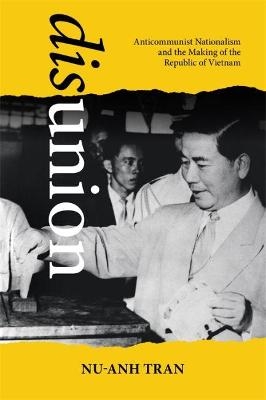
Disunion
Anticommunist Nationalism and the Making of the Republic of Vietnam
Seiten
2022
University of Hawai'i Press (Verlag)
978-0-8248-8786-5 (ISBN)
University of Hawai'i Press (Verlag)
978-0-8248-8786-5 (ISBN)
Since the 1950s, the domestic politics of the Republic of Vietnam (RVN) has puzzled outside observers. In this volume, Nu-Anh Tran shows how factional struggles in the Saigon-based republic reflected serious disagreements about political ideas at a pivotal moment in the lead-up to the Vietnam War.
Since the 1950s, the domestic politics of the Republic of Vietnam (RVN) has puzzled outside observers. To these external analysts, the American-backed regime seemed to be plagued by instability and factionalism for no apparent reason. Their bewilderment, however, has obscured a deep and complex history. In Disunion, Nu-Anh Tran shows how factional struggles in the Saigon-based republic reflected serious disagreements about political ideas at a pivotal moment in the lead-up to the Vietnam War.
The book traces the emergence of Vietnam’s anticommunist nationalists back to the struggle for independence and explores how their alliances were tested and then broken during the rule of the RVN’s first president, Ngô Đình Diệm. The anticommunists rejected the authoritarianism and ideology of the Vietnamese communists and dreamed of building an independent, democratic government that would unite the Vietnamese nation. The RVN was supposed to be the fulfillment of this long-cherished vision. But discord soon erupted among the anticommunists. Politicians fiercely debated to what extent the government should be democratic and which groups had a legitimate place in political life. The unresolved disagreements provoked intense and continuous infighting that troubled the RVN throughout the regime’s existence. Ultimately, the animosity undermined any possibility of realizing the anticommunists’ shared vision for the country.
Based on previously neglected primary sources and extensive research in Vietnamese and American archives, Disunion paints a rich and sensitive portrayal of leaders and activists in the RVN. Anticommunist nationalists were deeply devoted to their homeland and inspired by forward-looking visions, but they were also hobbled by their failure to live up to their lofty ideals. By examining these historical figures on their own terms, the book offers a fresh perspective on the political history of South Vietnam that has remained misunderstood to this day.
Since the 1950s, the domestic politics of the Republic of Vietnam (RVN) has puzzled outside observers. To these external analysts, the American-backed regime seemed to be plagued by instability and factionalism for no apparent reason. Their bewilderment, however, has obscured a deep and complex history. In Disunion, Nu-Anh Tran shows how factional struggles in the Saigon-based republic reflected serious disagreements about political ideas at a pivotal moment in the lead-up to the Vietnam War.
The book traces the emergence of Vietnam’s anticommunist nationalists back to the struggle for independence and explores how their alliances were tested and then broken during the rule of the RVN’s first president, Ngô Đình Diệm. The anticommunists rejected the authoritarianism and ideology of the Vietnamese communists and dreamed of building an independent, democratic government that would unite the Vietnamese nation. The RVN was supposed to be the fulfillment of this long-cherished vision. But discord soon erupted among the anticommunists. Politicians fiercely debated to what extent the government should be democratic and which groups had a legitimate place in political life. The unresolved disagreements provoked intense and continuous infighting that troubled the RVN throughout the regime’s existence. Ultimately, the animosity undermined any possibility of realizing the anticommunists’ shared vision for the country.
Based on previously neglected primary sources and extensive research in Vietnamese and American archives, Disunion paints a rich and sensitive portrayal of leaders and activists in the RVN. Anticommunist nationalists were deeply devoted to their homeland and inspired by forward-looking visions, but they were also hobbled by their failure to live up to their lofty ideals. By examining these historical figures on their own terms, the book offers a fresh perspective on the political history of South Vietnam that has remained misunderstood to this day.
Nu-Anh Tran is assistant professor in the Department of History and the Asian and Asian American Studies Institute at the University of Connecticut.
| Erscheinungsdatum | 10.03.2022 |
|---|---|
| Reihe/Serie | Studies of the Weatherhead East Asian Institute, Columbia University |
| Zusatzinfo | 8 b&w illustrations, 3 maps|(3) |
| Verlagsort | Honolulu, HI |
| Sprache | englisch |
| Maße | 152 x 229 mm |
| Gewicht | 534 g |
| Themenwelt | Sachbuch/Ratgeber ► Geschichte / Politik ► Allgemeines / Lexika |
| Geschichte ► Allgemeine Geschichte ► Zeitgeschichte | |
| Geisteswissenschaften ► Geschichte ► Regional- / Ländergeschichte | |
| Sozialwissenschaften ► Politik / Verwaltung ► Politische Systeme | |
| Sozialwissenschaften ► Politik / Verwaltung ► Politische Theorie | |
| ISBN-10 | 0-8248-8786-7 / 0824887867 |
| ISBN-13 | 978-0-8248-8786-5 / 9780824887865 |
| Zustand | Neuware |
| Haben Sie eine Frage zum Produkt? |
Mehr entdecken
aus dem Bereich
aus dem Bereich
Gewalt, Umwelt, Identität, Methode
Buch | Softcover (2024)
Spector Books OHG (Verlag)
CHF 49,95
wie Freud im Kollektiv verschwand
Buch | Hardcover (2024)
Klett-Cotta (Verlag)
CHF 34,95


